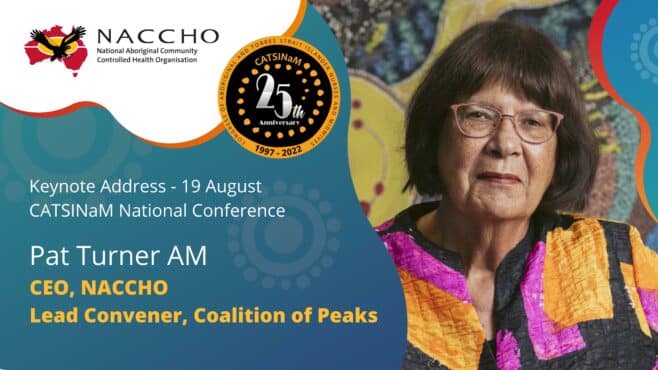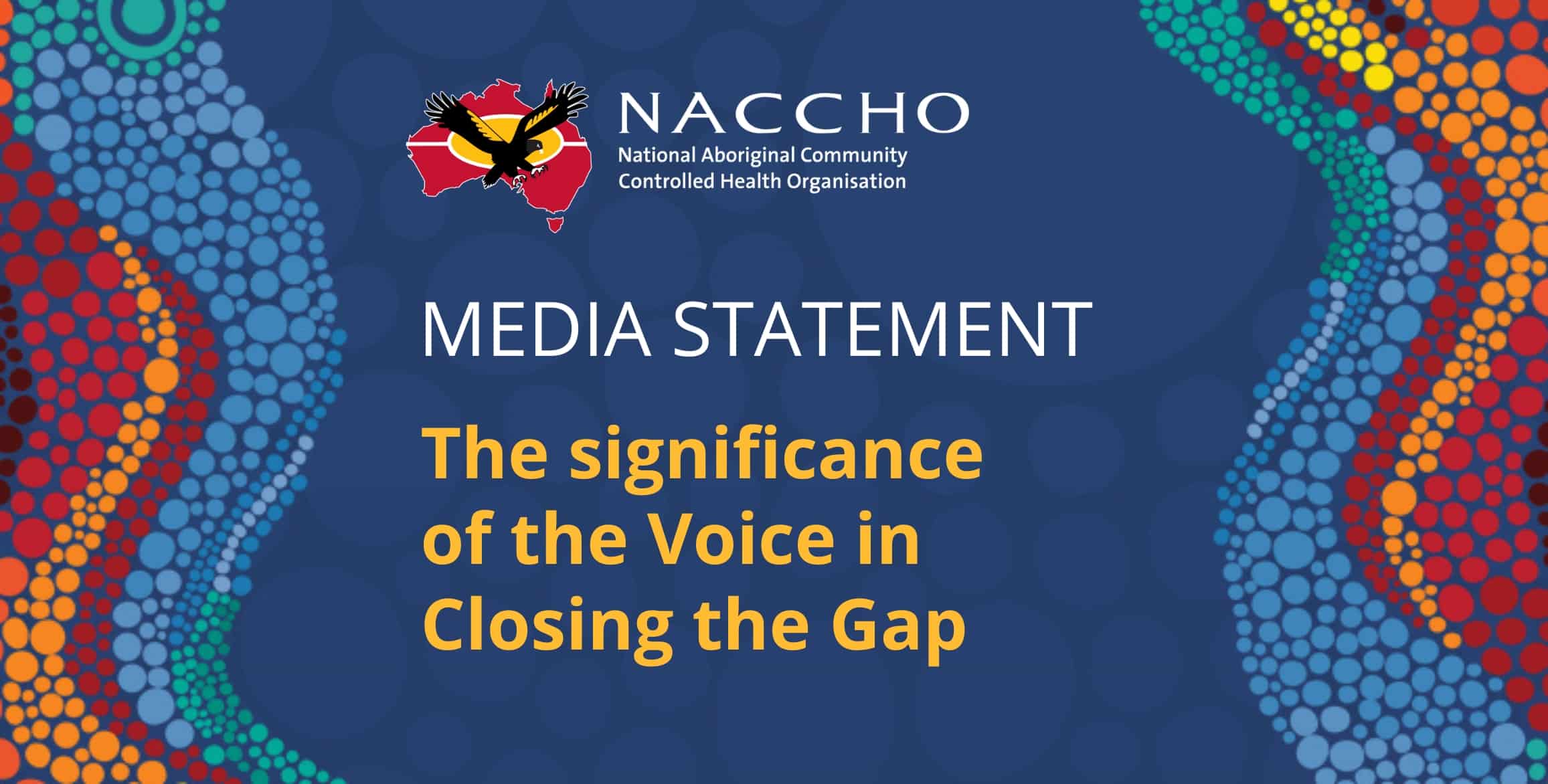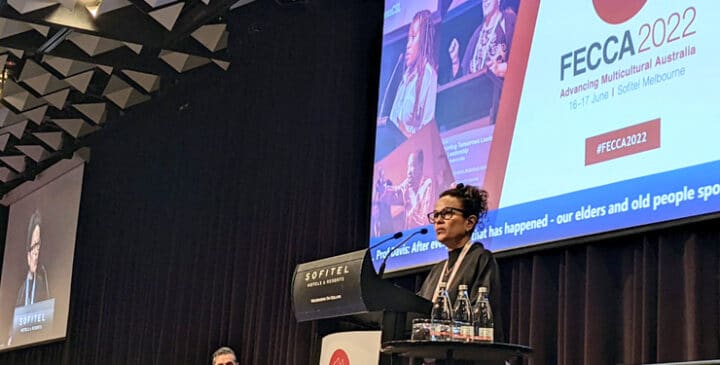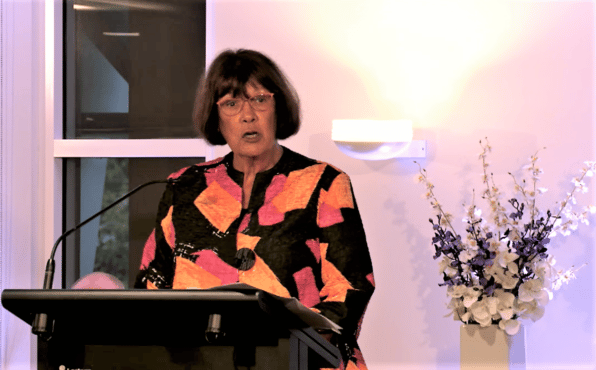

The significance of the Voice in Closing the Gap
University of Canberra Voice to Parliament Lecture with Pat Turner
Thursday 10 August, 5.30pm – 6.30pm
Shine Dome, 15 Gordon Street, Acton ACT
I will commence by acknowledging the Ngambri and Ngunawal peoples, the Traditional Owners of Canberra. I honour their Elders and the long history they have on this land, a heritage going well beyond the 25,000-year-old site of Birrigai Rock Shelter near Tidbinbilla.
I thank the University for such a warm welcome and the opportunity to speak to you on such an important topic. In particular, I thank Michelle Grattan, Vice-Chancellor Paddy Nixon and Professor Maree Meredith for inviting me here.
My name is Pat Turner. I am the CEO of the National Aboriginal Community Controlled Health Organisation – known as NACCHO – and I am the lead Convenor of the Coalition of Peaks.
I am the daughter of an Arrernte man and a Gurdanji woman and was raised in Alice Springs. It is with reference to my wonderful family that I would like to begin. Not just to share with you my story but because, within my family we have some very strong voices. And, although we have these individual voices who have been so successful as advocates for our people, what I sincerely believe is that we need a collective voice if we are to reap significant change.
As some of you will know, my uncle was Charlie Perkins. If ever there was a powerful individual Aboriginal voice in this country it was his. My Elders like Uncle Charlie or the inspirational Evelyn Scott taught me from a young age how hard we have to fight to be heard and how important it is to have a voice and how to use it. Be it Uncle Charlie’s work on the Freedom Ride in 1965, or his trailblazing career in the Public Service. Or be it Evelyn Scott’s work in the Advancement League and in advocating for the ‘yes’ vote in 1967.
They were wonderful leaders from whom we can all draw so much inspiration. And today, hopefully, I am walking in their footsteps and using my own personal voice to best effect. Indeed, it is heartening to see the next generation walking behind me. Women like Rachel Perkins, continuing the fight. Her work on the Frontier Wars – or the ‘Australian Wars’ as we should more correctly call them – is a major step forward in another element of the Uluru Statement from the Heart: truth telling.
So, while there is power in individual voices, let us consider what might be achieved through a collective Voice.
Well, I have to say, we did have an elected collective voice once. It was ATSIC. People jump to criticise ATSIC and dismiss it as being corrupt. But let me tell you – I was there – and I know that it was not. It was an organisation that brought our collective voices, from across the country, into the design of policies and programs that were intended for our benefit.
Because we were an Aboriginal organisation we were decommissioned overnight. The proverbial baby was thrown out with the bathwater. There was no discussion. No compromise. We were decommissioned with the stroke of pen. And look how things have nose-dived since that kneejerk decision.
It was a very political time for us. There was not much goodwill. Back in 2005, when we lost ATSIC, we saw the NT Intervention follow quickly afterwards. As we now know, this was based on lies and unfounded claims of systemic child abuse. It is from this extreme of paternalistic policymaking and a culture of “we know what’s best for you” that we have seen the gaps widen.
Since decommissioning ATSIC, the gaps have only widened. The Aboriginal people in this room can expect to live lives 10 per cent less than the non-Aboriginal people in this room. We will die 8-9 years earlier.
We are 33 times more likely to be imprisoned. Our children are 55-times more times likely to die from rheumatic heart disease. We have all heard these shameful statistics before. Yet, we must not become numb to them.
But what these statistics show us is that the current system is not working. The problem is so ‘big’ that I cannot see why anyone would not want to give something new ‘a go’.
I am dismayed at how the debate on the Voice has been hijacked by all sorts of nonsense and misinformation. We have a simple truth here. Believe it or not, Aboriginal people know what’s best for Aboriginal people. All we want is a say in our own affairs, not a veto, not an advantage over others. We want a fair go. And a Voice will help us get it.
I will tell you what happens when we have a Voice. Lives are saved. The gaps will begin to close. We have a concrete example. And again, I am talking from first-hand experience. It is something I saw for myself as the CEO of NACCHO.
It relates to the pandemic. Not much positive came out of COVID, but it did give us a great example of what happens when Aboriginal and Torres Strait Islanders are heard. When we have a voice.
Based on government data, about 2,000 Aboriginal and Torres Strait Islander lives were saved during the pandemic.[1]
This was because our communities spoke up and designed and implemented urgent COVID responses for their own communities.
We asked the Commonwealth to sit down with us and get an emergency plan in place. They agreed. They listened to us. We cut red tape, got funding out quickly and designed our own response.
The COVID measures we put in place:
- helped get the message out in our languages,
- helped get protective measures in place,
- allowed communities to run their own rapid system of contact tracing,
- financed community shut-downs, when necessary,
- helped protect elders by removing them to safe places,
- sourced mobile homes to be deployed to ensure isolation for infected patients in areas of overcrowded housing, and
- helped get a network established for the vulnerable to cope in the lockdowns and to keep them communicating with their families and friends.
We were lucky that the Department of Health was listening to us. But imagine what would have happened if they hadn’t. About 2,000 lives would have been lost.
Compare the result for the Navajo in the United States. That First Nation has the same level of disadvantage, the same comorbidities and burden of disease as Aboriginal people. But they did not take action to protect themselves and 2,000 Navajo lost their lives. They had the highest death rate of any ethnic group in North America.
The share of COVID deaths for Aboriginal and Torres Strait Islanders should have been over 2,250, yet only about 250 of our people, sadly, died from COVID by the end of last year.
Now, this example that I have just given you – about 2,000 lives saved – was provided in a media release, when the NACCHO Board released a strong public statement in support of the Voice in early July.
Although we are an organization of 145 ACCHOs operating 550 clinics across Australia, staffed by over 7,000 people and servicing 410,000 people each year in 3.1 million episodes of care, this message was ignored by the press. We are a huge sector. We are also the largest Aboriginal representative body in the country. As such, we expected this media statement to find some traction. Yet, when we released that statement, using COVID as an example of the power of a Voice – not one newspaper or media outlet picked it up as a story.
Less than one week after our press release, Professor Fiona Stanley said much the same thing. What happened when she said it? It was all over the press. I am not criticising Professor Stanley. She is a great Australian and a wonderful ally of our people and our cause. She, more than most non-Aboriginal people in the country understands our sector. The point I am making is this: when NACCHO spoke, no one listened, but when a renowned white woman said exactly the same thing, she was reported widely.
It seems to be too easy to ignore us, even when our message is based on good data and is clearly presented. So, this is another reason why we need a formal Voice. If we have a Voice that is enshrined, it can’t be closed down like ATSIC was and it will be much more likely to be given attention. It will force people in power to listen us.
They can reject what we say – and fair enough, that’s our democracy and their prerogative as elected representatives – but we deserve a fair hearing. Just a chance to be heard.
We should heed the words of Frantz Omar Fanon writing in 1961, in the last gasps of the Algerian War of Independence.
The settler makes history and is conscious of making it. And because he constantly refers to the history of his mother country, he clearly indicates that he himself is the extension of that mother country. Thus the history which he writes is not the history of the country which he plunders but the history of his own nation … [2]
Fanon’s warning applies to much of the material regarding Australia’s colonial past and most of our own storytelling, which is still very much in an English mould. It is the colonial voices that still prevail in so many of our policies and programs today. To cut through all this noise, we need our own clear Aboriginal Voice to balance things.
And Fanon’s example is very relevant at the moment. Look at the trouble in France recently. The causes of that civil unrest are complex, but I think we would all agree that there is strong element of the legacy of colonialism in the discord. Disaffected Algerian youths struggling to be accepted within the French nation is part of the explanation behind the recent violence and the rage.
I ask you to compare the discord we witnessed recently in Alice Springs. Last year, NACCHO supported AMSANT in warning governments against the removal of the alcohol restrictions in the NT. When this advice was ignored, we all saw the consequences and, subsequently, how the hasty reinstatement of those restrictions brought stability back to the affected communities, including Alice Springs, my hometown. But the long-term future in Central Australia – and any other disadvantaged area, for that matter – will never be resolved until the decades of neglect of investment in programs and social housing is addressed.
And the best way of building social cohesion is to listen to us and then co-design a solution with us, provide meaningful funding and then, as partners, share the decision making. It is a simple solution and it starts with a Voice.
The Uluru Statement from the Heart represented a major interruption to the existing policy debate on Indigenous Affairs. It asserts a right of our people to an ongoing voice in the Australian political system.
Put simply, it says we should have a say in the laws, policies and programs that have a significant effect on our lives and communities.
It is a straightforward idea.
If Aboriginal and Torres Strait Islander peoples have direct input into the decisions on policies and programs that impact on us, the outcomes will be vastly better than when those decision are made without us.
However, this straightforward idea was at first dismissed by then Prime Minister Turnbull and again by Prime Minister Morrison. In the face of this dismissal, we, Aboriginal people, persisted.
In late 2017, the Government commenced a tokenistic ‘refresh’ process for the Closing the Gap targets. It became clear to us in 2018 that it would be the same ‘business as usual’ process. So, NACCHO led the formation of a coalition of Aboriginal and Torres Strait Islander community-controlled organisations and peaks from across the country. We wrote to Prime Minister Morrison in late 2018 to say that we needed to be at the table on the Closing the Gap policy.
Remember, this was a government-led policy that had been around for ten years, and one from which we had been excluded. We put to the Commonwealth, and then all Australian governments, that Aboriginal and Torres Strait Islander representatives should share decision making with them on the policies and programs.
To their credit, governments accepted our proposition, and we agreed the historic Partnership Agreement on Closing the Gap in 2019.
It was the first intergovernmental agreement of its kind signed by all governments and representatives of our people, through the Coalition of Peaks.
Our coalition is now over 80 organisations strong.
This radically new way of working is set out in four priority reforms:
- Share decisions with Aboriginal and Torres Strait Islander representatives on matters that have a significant impact on us;
- Support and strengthen our community-controlled organisations to deliver expanded services and supports for our people;
- Ensure mainstream organisations and institutions funded by governments are safer for Aboriginal and Torres Strait Islander people, more responsive to our needs and contribute much more to Closing the Gap; and
- Share data at the regional level to help inform decision making on community priorities.
This partnership agreement is to be in place for at least ten years as is a commitment to have our voices, not just providing advice, but sharing decisions with governments.
I won’t go into any more detail on the National Agreement, but will be happy to take questions on it, after I have finished presenting this paper. But I do want to make two further points.
One is that the Agreement primarily covers the delivery of services. But let’s not forget Aboriginal and Torres Strait Islander languages and cultural heritages. In those and other areas, the Voice will be a critical element.
My second point relates to the recent criticism made by the Productivity Commission of the slow pace in most government agencies’ in implementing the National Agreement. The Commission is correct. We have a long way to go before this commitment from all governments is fully implemented by all agencies. But I do think that having a Voice will help accelerate this process.
I also note that Michelle Grattan, in one of her recent articles, used the Productivity Commission’s Report as an example of the importance of governments listening to our people and in honouring their commitments to change. It highlights the case for a Voice.
When I reflect on the public debate about the Voice, there is no one who is disagreeing that our voices should not be central to the decisions of government that are mostly about us.
Our Uluru Statement campaigners, the members of the Coalition of Peaks, and all our community-controlled organisations should be proud of this achievement. We have fundamentally altered the national discussion on whether Aboriginal and Torres Strait Islander people should be heard in the Australian political system.
We need to make it clear that our Voice needs to be around for good to really drive the change needed in government to ensure we are properly heard. The best way to do this is to have our Voice enshrined in the Constitution.
The upcoming referendum is the most important vote of our collective lifetimes.
The majority of Australians already agree that Aboriginal and Torres Strait Islander people should have a say on policies and programs that have a significant impact on us.
But we need this to be an enduring agreement from Australians.
Saying yes to this being included in our Constitution is a decision about what kind of Australia we want to live in. A decision on what kind of future we want for all of us, not just for Aboriginal and Torres Strait Islander people.
A future where our peoples, as First Peoples of this country, can be heard.
Thank you.
[1] If asked about the 2,000 lives saved – Minister Hunt estimated that 30,000 Australians were expected to die from COVID. By the end of 2022 about 250 Aboriginal and Torres Strat Islanders had died, yet their share of the 30,000 was 2,277 (3.3% x 30,000 = 990; then adjusted for the burden of disease x 2.3 = 2,277).
[2] F. O. Fanon, Les Damnés de la Terre, trans. C. Farrington, Penguin, London, 1967, p. 40.

